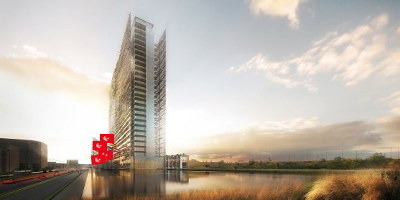The EPO with flags that are more appropriate
 "The cost of that renovation [Battistelli's new penthouse] is impossible to ascertain due to it being lumped in with the massive construction costs of the new [Nouvel] building." --Kieren McCarthy for The Register
"The cost of that renovation [Battistelli's new penthouse] is impossible to ascertain due to it being lumped in with the massive construction costs of the new [Nouvel] building." --Kieren McCarthy for The Register
Summary: How TBI Holding, the company that 'won' the tender (as notorious as these can be), is actually a victim of EPO underpaying for the work, having also spent some of the budget on Battistelli's new penthouse
THE Nouvel building which is a fire hazard has become the subject of Dutch journalism quite recently.
"Battistelli likes to boast about investing 250 million in a new building,"
Petra Kramer told me yesterday. "But it turns out that the contractor who is building the new office expects to lose 22.3 million euro on it,"
she continued. "An article I missed last month," she
said, shows that "Battistelli does not only exploit employees, he exploits contractors as well."
Kramer has translated the article (
Source:
fd.nl; Paywalled, workaround: Google the headline, click the search result. It doesn't work with any other search engine.) and wrote the following summary of it:
The EPO's Battistelli likes to boast how his office is a boon to the Dutch economy. As NRC reported in March last year: "We're investing 250 million in a new office-building. We add 1 billion in revenue to the Dutch economy."
Upon closer inspection it turns out that 25% of the EPO's contribution to the Dutch economy is not so much of a contribution. It's actually leeching. The contractor that won the tender for building the new office did so at the bottom of the market in 2013 when we were struck by the eurocrisis.
On top of that, the EPO used a "relatively new form of contracting" which outsources all the risk to the contractor. The contractor is fully responsible for "for design, system engineering and testing". In other words: the EPO exploits contractors like they exploit their employees. It's akin to a person overeating at an all you eat can buffet and then blaming the restaurant for throwing up.
TBI Holding, the contractor, expects to lose 22.3 million euros, which means the EPO got away by paying 10% less than the actual costs of the project. In retrospect they lament having entered into the contract too light-heartedly.
TBI Holding had a great year, for example they built 20% more homes than in 2015 but their bottom line, the net profit, was crushed by the EPO. According to Financieel Dagblad (the Dutch Financial Times), TBI holding could have made a profit of 15 million, thanks to the EPO the end-result is a net loss of 16.7 million.
Source used:
fd.nl
Remember that the EPO is immune and thus safe from litigation/prosecution in this case.
Here is the full translation of the corresponding article:
Construction of European Patent Office curtails TBI
The Rotterdam builder TBI suffered losses in 2016 by a project that was taken at risk in crisis times. For the new building of the European Patent Office in Rijswijk, a provision of € 22.3 mln was made last year. Together with the merger costs of two subsidiaries last year, a net loss of 16.7 mln resulted.
This is apparent from Friday's published annual figures of the group. TBI Holding is known for subsidiaries as J.P. Van Eesteren, Mobilis and the fused Croonwolter & Dros.
'Underlying good year'
Sperling, chairman of TBI, states that 2016 was "underlying a good year". House sales increased by 35%, the order book increased by almost 20% and the solvency criterion for financial soundness improved to 36%. Without the EPO set-back, the net profit would have been 5.6% higher at € 15 mln.
'The huge provision is disappointing,' said Sperling.
The new construction of the European institution has been taken at the bottom of the market. In 2013, a relatively new contract form was signed, with the full responsibility for design, system engineering and testing at the contractor.
Too light-hearted
That responsibility proved complex, intensive and costly according to the chairman of the board. Sperling: "We considered this too light-hearted. In retrospect, we had to ask for a higher price. "
The three divisions in which the companies of TBI are grouped booked varying results. At Technology, operating revenues decreased, but operating profit increased. The margin thus increased from 0.6% to 0.9%. Construction and development increased sales and results. The margin increased from 1.9% to 2.6%. At Infra, volume and price pressure was maintained. Sales rose, but operating profit fell to € 300,000, which dropped the margin from 1.9% to 0.1%.
So much for 'helping' the Dutch economy...
⬆

 "The cost of that renovation [Battistelli's new penthouse] is impossible to ascertain due to it being lumped in with the massive construction costs of the new [Nouvel] building." --Kieren McCarthy for The Register
"The cost of that renovation [Battistelli's new penthouse] is impossible to ascertain due to it being lumped in with the massive construction costs of the new [Nouvel] building." --Kieren McCarthy for The Register